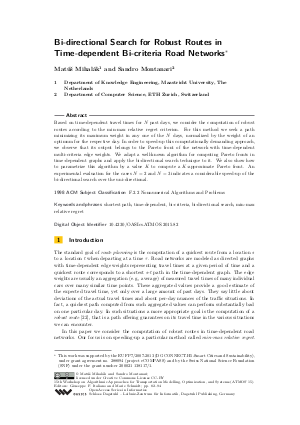Bi-directional Search for Robust Routes in Time-dependent Bi-criteria Road Networks
Authors Matúš Mihalák, Sandro Montanari
-
Part of:
Volume:
15th Workshop on Algorithmic Approaches for Transportation Modelling, Optimization, and Systems (ATMOS 2015)
Part of: Series: Open Access Series in Informatics (OASIcs)
Part of: Conference: Symposium on Algorithmic Approaches for Transportation Modelling, Optimization, and Systems (ATMOS) - License:
 Creative Commons Attribution 3.0 Unported license
Creative Commons Attribution 3.0 Unported license
- Publication Date: 2015-09-14
File

PDF
OASIcs.ATMOS.2015.82.pdf
- Filesize: 0.55 MB
- 13 pages
Document Identifiers
Subject Classification
Keywords
- shortest path
- time-dependent
- bi-criteria
- bi-directional search
- min-max relative regret
Metrics
- Access Statistics
-
Total Accesses (updated on a weekly basis)
0Document
0Metadata
Abstract
Based on time-dependent travel times for N past days, we consider the computation of robust routes according to the min-max relative regret criterion. For this method we seek a path minimizing its maximum weight in any one of the N days, normalized by the weight of an optimum for the respective day. In order to speed-up this computationally demanding approach, we observe that its output belongs to the Pareto front of the network with time-dependent multi-criteria edge weights. We adapt a well-known algorithm for computing Pareto fronts in time-dependent graphs and apply the bi-directional search technique to it. We also show how to parametrize this algorithm by a value K to compute a K-approximate Pareto front. An experimental evaluation for the cases N = 2 and N = 3 indicates a considerable speed-up of the bi-directional search over the uni-directional.
Cite As Get BibTex
Matúš Mihalák and Sandro Montanari. Bi-directional Search for Robust Routes in Time-dependent Bi-criteria Road Networks. In 15th Workshop on Algorithmic Approaches for Transportation Modelling, Optimization, and Systems (ATMOS 2015). Open Access Series in Informatics (OASIcs), Volume 48, pp. 82-94, Schloss Dagstuhl – Leibniz-Zentrum für Informatik (2015)
https://doi.org/10.4230/OASIcs.ATMOS.2015.82
BibTex
@InProceedings{mihalak_et_al:OASIcs.ATMOS.2015.82,
author = {Mihal\'{a}k, Mat\'{u}\v{s} and Montanari, Sandro},
title = {{Bi-directional Search for Robust Routes in Time-dependent Bi-criteria Road Networks}},
booktitle = {15th Workshop on Algorithmic Approaches for Transportation Modelling, Optimization, and Systems (ATMOS 2015)},
pages = {82--94},
series = {Open Access Series in Informatics (OASIcs)},
ISBN = {978-3-939897-99-6},
ISSN = {2190-6807},
year = {2015},
volume = {48},
editor = {Italiano, Giuseppe F. and Schmidt, Marie},
publisher = {Schloss Dagstuhl -- Leibniz-Zentrum f{\"u}r Informatik},
address = {Dagstuhl, Germany},
URL = {https://drops.dagstuhl.de/entities/document/10.4230/OASIcs.ATMOS.2015.82},
URN = {urn:nbn:de:0030-drops-54561},
doi = {10.4230/OASIcs.ATMOS.2015.82},
annote = {Keywords: shortest path, time-dependent, bi-criteria, bi-directional search, min-max relative regret}
}
Author Details
References
-
H. Aissi, C. Bazgan, and D. Vanderpooten. Min-max and min-max regret versions of combinatorial optimization problems: A survey. European Journal of Operational Research, 197(2):427-438, 2009.

-
G. V. Batz, R. Geisberger, P. Sanders, and C. Vetter. Minimum time-dependent travel times with contraction hierarchies. ACM Journal of Experimental Algorithmics, 18, 2013.

-
G. V. Batz and P. Sanders. Time-dependent route planning with generalized objective functions. In ESA, pages 169-180, 2012.

-
J. M. Buhmann, M. Mihalák, R. Šrámek, and P. Widmayer. Robust optimization in the presence of uncertainty. In ITCS, pages 505-514, 2013.

- European Commission. eCOMPASS Project. http://www.ecompass-project.eu/, 2011-2014.
-
C. Daskalakis, I. Diakonikolas, and M. Yannakakis. How good is the chord algorithm? CoRR, abs/1309.7084, 2013.

-
D. Delling. Time-dependent SHARC-routing. Algorithmica, 60(1):60-94, 2011.

-
D. Delling and D. Wagner. Pareto paths with SHARC. In SEA, pages 125-136, 2009.

-
S. Demeyer, J. Goedgebeur, P. Audenaert, M. Pickavet, and P. Demeester. Speeding up Martins' algorithm for multiple objective shortest path problems. 4OR, 11(4):323-348, 2013.

-
S. Erb, M. Kobitzsch, and P. Sanders. Parallel bi-objective shortest paths using weight-balanced B-trees with bulk updates. In SEA, pages 111-122, 2014.

-
L. Foschini, J. Hershberger, and S. Suri. On the complexity of time-dependent shortest paths. Algorithmica, 68(4):1075-1097, 2014.

-
S. Funke and S. Storandt. Polynomial-time construction of contraction hierarchies for multi-criteria objectives. In ALENEX, pages 41-54, 2013.

-
M. R. Garey and D. S. Johnson. Computers and Intractability: A Guide to the Theory of NP-Completeness. W. H. Freeman, 1979.

-
R. Geisberger, M. Kobitzsch, and P. Sanders. Route planning with flexible objective functions. In ALENEX, pages 124-137, 2010.

-
A. V. Goldberg and C. Harrelson. Computing the shortest path: A* search meets graph theory. In SODA, pages 156-165, 2005.

-
A. V. Goldberg and R. F. Werneck. Computing point-to-point shortest paths from external memory. In ALENEX, pages 26-40, 2005.

-
T. Gräbener, A. Berro, and Y. Duthen. Time dependent multiobjective best path for multimodal urban routing. Electronic Notes in Discrete Mathematics, 36, 2010.

-
H. W. Hamacher, S. Ruzika, and S. A. Tjandra. Algorithms for time-dependent bicriteria shortest path problems. Discrete Optimization, 3(3):238-254, 2006.

-
P. Hansen. Bicriterion path problems. In Multiple Criteria Decision Making Theory and Application, pages 109-127. Springer Berlin Heidelberg, 1980.

-
J. Hershberger, M. Maxel, and S. Suri. Finding the k shortest simple paths: A new algorithm and its implementation. ACM Transactions on Algorithms, 3(4), 2007.

-
S. C. Kontogiannis and C. D. Zaroliagis. Distance oracles for time-dependent networks. In ICALP 2014, pages 713-725, 2014.

-
P. Kouvelis and G. Yu. Robust discrete optimization and its applications, volume 14. Springer Science &Business Media, 2013.

-
E. Q. V. Martins. On a multicriteria shortest path problem. European Journal of Operational Research, 16(2):236-245, 1984.

-
G. Nannicini, D. Delling, D. Schultes, and L. Liberti. Bidirectional A* search on time-dependent road networks. Networks, 59(2):240-251, 2012.

-
G. Yu and J. Yang. On the robust shortest path problem. Computers & OR, 25(6):457-468, 1998.

